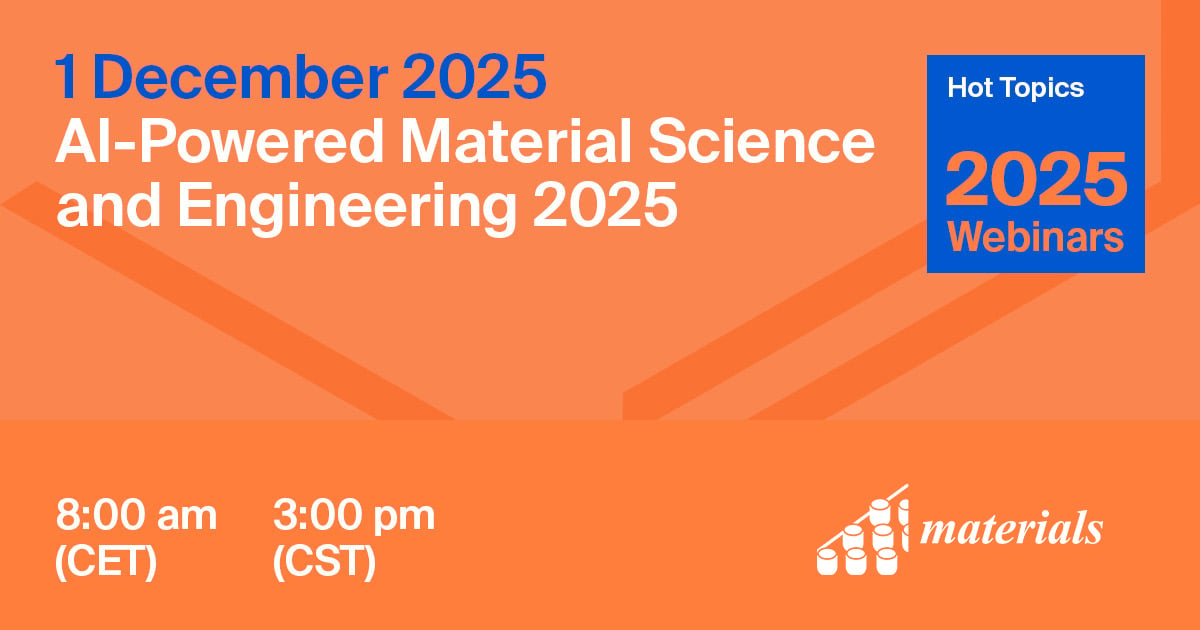
MDPI Webinar | AI-Powered Materials Science and Engineering, 1 December 2025
The MDPI webinar “AI-Powered Material Science and Engineering” brings together leading experts to explore how artificial intelligence is accelerating the discovery, characterization, and modeling of advanced materials across different scales. AI-driven tools now enable researchers to predict material behavior, interpret complex structural data, and significantly increase the speed of innovation compared to traditional experimental methods. This webinar features Prof. Dr. Jian Feng Wang from City University of Hong Kong, an internationally recognized expert in the micro–macro mechanics of granular materials; his work integrates X-ray CT, discrete element modeling, and machine learning-based pattern recognition to reveal the multiscale physics governing soil behavior. Also joining is Prof. Dr. Stefano Mariani from the Polytechnic University of Milan, whose research spans the reliability of MEMS, structural health monitoring using machine learning and deep learning, advanced fracture simulations, and multiscale modeling, supported by extensive experience across international research institutions. Together, they will demonstrate how AI enhances understanding from particle-scale mechanics to complex structural systems.
MDPI has 115 journals under the subject of "Chemistry & Materials Science"; please click here for further details.
Date: 1 December 2025
Time: 8:00 a.m. CET | 3:00 p.m. CST
Webinar ID: 826 5862 3549
Webinar Secretariat: journal.webinar@mdpi.com
Webinar webpage: https://sciforum.net/event/HTWAI-1
Time in CET
|
Program |
Time in CET |
|
MDPI Host |
8:00–8:05 a.m. |
|
Prof. Dr. Jian Feng Wang In this talk, I will present our recent progress on the micro/macro-mechanical investigation of granular soils subject to triaxial shearing using an integrated approach of X-ray micro-computed tomography (CT), three-dimensional discrete element modelling, and deep learning. Particular focus will be placed on the recent development of data-driven constitutive models of granular soils. Our results show that the effects of particle morphology, confining pressure, and initial sample density on the constitutive responses of real granular soils can be well captured by the typical recurrent neural network models, such as long short-term memory neural networks (LSTM) and gate recurrent unit neural networks (GRU). The developed deep learning models can effectively learn and reflect the intrinsic physical mechanisms underlying granular material behavior, such as stress–strain, volumetric compression and dilatancy, strain hardening and softening, and shear-induced fabric evolutions. Our latest results using a deep transfer learning technique called the few-shot learning strategy will also be presented. This talk will allow the attendees to gain an overview of the latest, cutting-edge developments of deep learning methods in the CT-based constitutive modelling of granular soils. |
8:05–8:40 a.m. |
|
Prof. Dr. Stefano Mariani Materials informatics is gaining popularity for predicting the overall mechanical properties of multi-phase and polycrystalline composites. Data-driven strategies can be exploited within this framework to learn microstructural features and their relationship with the resulting macroscopic properties. However, adopting such approaches to assess the load-bearing capacity and reliability of structures and devices, accounting for stochastic effects at the microscale, still requires careful consideration, especially when only limited data or computational resources are available. In this talk, a strategy is proposed to address problems characterized by strong gradients in the stress and strain fields, which hinder the use of standard homogenization techniques. A generative adversarial network (GAN) is employed to generate reliable proxies of actual microstructures and predict the overall behavior of the studied multi-phase materials. |
8:40–9:15 a.m. |
|
Q&A Session |
9:15–9:40 a.m. |
|
MDPI Host |
9:40–9:45 p.m. |
After registering, you will receive a confirmation email containing information on how to join the webinar. Registrations with academic or institutional email addresses will be prioritized.
Unable to attend? Feel free to still register; we will inform you when the recording is available.
Webinar Chair and Keynote Speaker:
- Prof. Dr. Jian Feng Wang, Department of Architecture and Civil Engineering, City University of Hong Kong;
- Prof. Dr. Stefano Mariani, Department of Civil and Environmental Engineering, Politecnico di Milano.
Relevant Special Issue:
“Artificial Intelligence and Machine Learning for Material Design, Discovery, and Optimization”
Guest Editors: Dr. Craig Hamel and Dr. Devin J. Roach
Deadline for manuscript submissions: 20 May 2026
